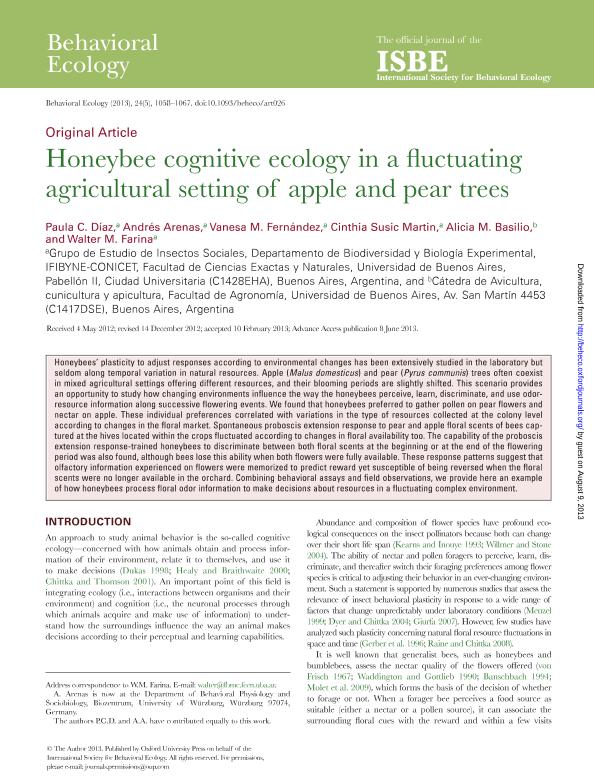Artículo
Honeybee cognitive ecology in a fluctuating agricultural setting of apple and pear trees
Diaz, Paula Carolina ; Arenas, Andres
; Arenas, Andres ; Fernandez, Vanesa Maribel
; Fernandez, Vanesa Maribel ; Susic Martín, Cinthia Soledad
; Susic Martín, Cinthia Soledad ; Basilio, Alicia Mabel; Farina, Walter Marcelo
; Basilio, Alicia Mabel; Farina, Walter Marcelo
 ; Arenas, Andres
; Arenas, Andres ; Fernandez, Vanesa Maribel
; Fernandez, Vanesa Maribel ; Susic Martín, Cinthia Soledad
; Susic Martín, Cinthia Soledad ; Basilio, Alicia Mabel; Farina, Walter Marcelo
; Basilio, Alicia Mabel; Farina, Walter Marcelo
Fecha de publicación:
06/2013
Editorial:
Oxford University Press
Revista:
Behavioral Ecology
ISSN:
1045-2249
Idioma:
Inglés
Tipo de recurso:
Artículo publicado
Clasificación temática:
Resumen
Honeybees’ plasticity to adjust responses according to environmental changes has been extensively studied in the laboratory but seldom along temporal variation in natural resources. Apple (Malus domesticus) and pear (Pyrus communis) trees often coexist in mixed agricultural settings offering different resources, and their blooming periods are slightly shifted. This scenario provides an opportunity to study how changing environments influence the way the honeybees perceive, learn, discriminate, and use odorresource information along successive flowering events. We found that honeybees preferred to gather pollen on pear flowers and nectar on apple. These individual preferences correlated with variations in the type of resources collected at the colony level according to changes in the floral market. Spontaneous proboscis extension response to pear and apple floral scents of bees captured at the hives located within the crops fluctuated according to changes in floral availability too. The capability of the proboscis extension response-trained honeybees to discriminate between both floral scents at the beginning or at the end of the flowering period was also found, although bees lose this ability when both flowers were fully available. These response patterns suggest that olfactory information experienced on flowers were memorized to predict reward yet susceptible of being reversed when the floral scents were no longer available in the orchard. Combining behavioral assays and field observations, we provide here an example of how honeybees process floral odor information to make decisions about resources in a fluctuating complex environment.
Palabras clave:
Apis Mellifera
,
Termporal Variation
,
Per
,
Odor Information
Archivos asociados
Licencia
Identificadores
Colecciones
Articulos(IFIBYNE)
Articulos de INST.DE FISIOL., BIOL.MOLECULAR Y NEUROCIENCIAS
Articulos de INST.DE FISIOL., BIOL.MOLECULAR Y NEUROCIENCIAS
Citación
Diaz, Paula Carolina; Arenas, Andres; Fernandez, Vanesa Maribel; Susic Martín, Cinthia Soledad; Basilio, Alicia Mabel; et al.; Honeybee cognitive ecology in a fluctuating agricultural setting of apple and pear trees; Oxford University Press; Behavioral Ecology; 24; 5; 6-2013; 1058-1067
Compartir
Altmétricas



